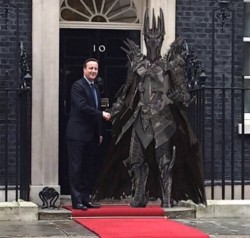Monthly Archives: November 2015
A little while ago, Southern Tech played Utica in a game that came down to the final minutes. Going in to half-time, it looked like Utica was going to win but we had a blockbuster third quarter where a fluke play (a ball bouncing off one of our players and into a defender’s hands) prevented us from putting the game away.
One of the events of the third quarter were a string of Utica penalties to our benefit. Only to our marginal benefit, however. Because when you’re near the endzone, as we were, “half the distance to the goal” only does so much. So they got a pass interference penalty, followed by Utica objections, followed by more Utica objections, followed by the Utica coach coming out on the field. And an automatic The penalties, however, took the ball from the 8 to the four, the four to the two, and the two to the one. The ref was absolutely exasperated as he outlined all of the events.
Given that these (except possibly the first one) these were penalty-penalties, it seems weird to me that there’s nothing they can do but mark off some inches on fifteen yard penalties.
So Les Miles was supposed to be fired from LSU and wasn’t. So instead of writing about how difficult it is for him to find work, I’m left writing about… what? Well, mostly why the firing didn’t occur. The main answer is fan support. The victory over Texas A&M that precipitated the reversal was good but nothing special. What was notable was the overwhelming support that seemed to be coming from LSU fans. I have some connections with the school, some people on my Twitter feed, and so on. The desire that he be kept around was nigh-universal.
The only one of the coaches I listed in the previous post who meets that criteria (including Solich and Cristobal, who I mention but don’t get into it) was Mike Leach. I scanned the Texas Tech message boards after his termination and eventually they just had to close of all conversations on the topic because Tuberville was their new coach and it was time to move on. It was starting to shape up like this was going to be one of those situations.
Despite an aversion to firing successful coaches, I was ambivalent about the direction that LSU appeared to be headed. Which is to say that I am less impressed with Miles’ performance than many Tiger fans (which perhaps affected my view of his prospects). He won championships, but he took over a championship program. And some of it was watching him back in his days at Oklahoma State, where Big 12 fans will probably always see him as the goober on the Cowboy sidelines. But it was hard to argue with his record and while his act may have worn thin with admin, the fans it certainly hasn’t with the fans.
So now instead of Miles looking for work, it looks like it might be Joe Alleva, the athletic director, who will be looking for a new job since. It’s hard to overstate the embarrassment this sort of thing causes. I had assumed, on some level, that there had been more fan discontent than existed. Which was maybe their assumption, too (or maybe not, as some reports indicate that the leaks were to try to build support for his ouster). But even if we share the assumption, it’s not my job to understand fan sentiment.
LSU will be hosting Texas A&M this weekend. An LSU-A&M rivalry seems like something that was meant to be, but the chances of them playing one another every Thanksgiving are remote. Why? LSU wants a home game. It’s the same situation as the University of Texas, which alternates Thanksgiving games between Texas Tech and TCU so that they can play at home every year. This is dumb. The games are what you make of them, and if you’re relegating potential rivalries to Just Another Home Game status, that’s kind of what they become.
In my mind, there is rarely an excuse not to have a designated opponent in the final week. It doesn’t even need to be your primary rival. It can be an opportunity to create a new one. Southern Tech consistently played a particular team towards the end of the season and as both teams had a good streak, it took on increased importance. Despite the schools having little in common but being in the EMC-South, a little rivalry developed (at least in my mind). That’s how it should be.
Memphis head coach Justin Fuente has been hired by Virginia Tech. This was announced at half-time of the Memphis game. That sounds awkward. Fuente will be making less money at Virginia Tech than Memphis was prepared to offer, and he had to agree to keep the current coach’s coordinators. He must have wanted out of Memphis very, very badly.
Watching the game between BYU and Utah State, the announcers repeatedly referred to them as arch-rivals. When BYU left the Mountain West Conference to become independent, I don’t think an archrivalry with Utah State was what they had in mind.
I thought of this immediately after the game before seeing this article, but sometimes a blown call works in your favor. With little time left, a Notre Dame touchdown that shouldn’t have been a touchdown inexplicably wasn’t called back. In all likelihood, that saved Stanford’s game because it gave them time on the clock to score a last second field goal.
Got outflanked by a dude who eats grass and is unsure how clocks work. Happens pic.twitter.com/NNeDjV4N9l
— Brian Floyd (@BrianMFloyd) November 29, 2015
 Emily Yoffe has announced that her days of Prudence are at an end.
Emily Yoffe has announced that her days of Prudence are at an end.
Bloggingheads is ten years old. Founders Robert Wright and Mickey Kaus reunite to talk about it.
When local newscasters try just a little too hard.
Alanis Morissette updates Ironic.
The Force is strong with this one. I used the Imperial Death March, along with the themes to Mario Bros and Zelda, to distract Lain when she was tiny.
A pilot says that Allegiant Air fired him for putting passenger safety first.
Noah Smith says minimum wages are great, except when they’re not.
Catalonia takes steps towards independence.
It’s not just a retailers’ payday. Black Friday is a big moneymaker for plumbers.
Developing countries are told they will need to make some sacrifices to avert Climate Change. Samir Saran says India should decline.
The Montana Standard is unmasking its commenters. {More}
Refusing change is indeed not the way to Keep Austin Weird. Unsurprisingly, I oppose anti-group housing laws.
An international group of architects seek to build a new Colossus of Rhodes.
Tim Marshall writes of Russia’s unfortunate geography, and why it’s so concerned with its eastern neighbors.
Fortune looks at the prospects of knowledge workers being replaced by thinking machines.
A new study suggests that there may be many Earths to come.
@Louise_McSorley There are 424 male jockeys in Australia. https://t.co/rzQWwcBLg3
— AU Bureau of Stats (@ABSStats) November 4, 2015
There is a scene in the first season of The West Wing where Jed Bartlet is discussing gun control with Vice President John Hoynes of Texas. Bartlet is trying to get Hoynes to sign on to prohibit concealed handgun carry. In what I’m sure was a QED argument in writer Aaron Sorkin’s head, Bartlet asked if guns are supposed to deter violence with their presence, why should they be concealed. One can imagine the “Boom!” in Sorkin’s mind as he expressed this. There may be a point there, but what it eludes is that largely the same people that object to concealed carry also object to open carry. From my own perspective, there are arguments for why guns should be visible and arguments for why they should be hidden, but if you’re arguing whatever is in front of you it becomes clear that the “carry” is the problem rather than the “open” or “closed.”
—-
A week or two back, Jaybird sent me this link about HUD’s plans to ban smoking in its housing:
“What I do in my apartment should be my problem, long as I pay my rent,” said Gary Smith, 47, a cigarette in hand as he sat outside the door to a building in the Walt Whitman Houses in the Fort Greene section of Brooklyn.
The impact of the prohibition would be felt most heavily by the New York City Housing Authority, which is known as Nycha and houses more than 400,000 people in about 178,000 apartments. Though it is the largest public housing agency in the country, it has lagged behind many of its smaller counterparts in adopting smoke-free policies.
Since the federal government began to press for smoking bans in public housing in 2009, more than 600 agencies encompassing over 200,000 households have voluntarily barred indoor smoking. In moving to require the prohibitions across the country, federal officials say they are acting to protect residents from secondhand smoke, which can travel through walls and under doors; to reduce the risk of fires; and to lower building maintenance costs.

Photo by ale’streets 
The reason given is characteristically weak, however. A lot of the people who live here live alone, and with other smokers, and no distinctions are made. While smoke can escape into neighboring apartments, it’s less likely to be an issue if they smoke indoors than if you push them outside.
Which brings us to the other side of things. The Bartlet/Hoynes discussion. There are arguments for why we would want smokers to smoke indoors, and arguments for why we want to push them outside. Each offer their own set of benefits and drawbacks. Indoors is more likely to cause acute distress among people in whatever room it is occurring. But outdoors makes it harder to avoid. But if smoking is to be legal, it does need to be legal somewhere. This applies both to indoors/outdoors discussions and location more generally. And as we’ve banned smoking in public places, there has been the implicit agreement that they should be able to smoke in their own private places. Now, of course, that too is being questioned.
The new HUD regulation has opened up a flurry of advocacy over at Vox about smoking bans generally. Dylan Matthews says – with obvious lament – that we can’t ban all indoor smoking even though it would be more fair[1]. German Lopez endorses the idea anyway. This is ostensibly due to concerns over second-hand smoke, but it relies on shoddy data. And while at present there are no plans to include ecigarettes in the mandate, they’re discussing it despite there being little indication that the justification of the fear carries over and almost all movement on ecigarettes has been towards including them in smoking bans[2].
Doing so, of course, will push people outside and their smoking into more public areas. Except that we’re trying to move smoking out of public areas. Which pushes it back inside. But we don’t want people smoking inside. The government has the ability to influence people through HUD, but that’s unfair to people who rely on government housing. So in the sake of fairness we should consider making it uniform. If they can’t smoke here, why should they be able to smoke there? If they can’t smoke there, why should they be able to smoke in that other place?
The ostensible rationales for these policies are getting lost in the shuffle, in part due to the desire of uniformity. The only uniformity that can occur, is to allow smoking anywhere and to allow it nowhere. The first is unacceptable and most people know better than the explicitly advocate the latter. But to avoid the latter, we need to answer the basic question of where we should consider smoking to be permissible. It’s not clear that we have any place in mind.
[1] Taking us way out of any ostensible “landlord’s choice” rationale which I can be on board with. And if you’re paying attention, it should be clear that the second-hand smoking pretext has its limitations, and those limitations are being ignored.
[2] Admittedly, the statist in me is intrigued at using these regulations as an inducement for people to switch to vaping. To do so, of course, would mean accepting that people are going to consume nicotine in form that looks like smoking. I don’t think that’s likely.
 At Unz.com, Chanda Chisala looks at intelligence and two different African-American populations.
At Unz.com, Chanda Chisala looks at intelligence and two different African-American populations.
Lauren Gurley writes about the urban bias of sociology and the left’s disinterest in rural American poverty.
Recently I linkied a liberal case against Birthright Citizenship. This week, the conservative case for Birthright Citizenship.
Under a new definition of planethood, the moon is a planet.
The Swedish central bank has a negative interest rate on deposits, leading people to stash their money at home.
Gabriel Rossman has some smart words about excessive statistical controls, where if you don’t like the effects of X, you simply control for X.
Adam Ozimek lays down his predictions for 2045.
Dr Farah Khan explains how she deals with racist patients and the frustration of being denied as an Indian and an American.
Reviewing a book, Jesse Singal looks at the black activists who helped launch the drug war. In the comment section of a related article, Freddie chimes in.
It appears attempts to hook ruralia up with broadband was evidently a spectacular failure.
Kris Hartley writes of the potential of rural industrialization in China.
Drone Assassin: A Feminist Success Story
I have historically thought their virtues were overrated, but I’m coming around on the idea of nonpartisan elections (at least at the state and local levels).
The hardship of being obscenely rich.
Brian Boyd writes of the Nietzchean nature of Gotham.
“The seven names will be put to a public vote at a still to-be-determined date, allowing the masses to bring UND into a new era. And I think we can all agree that as long as voters don’t choose “Fighting Hawks,” everything will be alright.” -Zack Barnett
Longtime readers may recall that I have commented on the University of North Dakota mascot situation on a few occasions and Linklusters. The basic story is that the North Dakota Sioux had to find a new mascot due to the NCAA regulations. There are two Sioux tribes in the region and one supported the nickname and imagery while the other opposed it. Boosters and the state dug in their heels, with the former bankrolling a flooding of imagery of the logo while the state passed a law preventing them from changing their name. The result is that the University of North Dakota missed out on their chance at joining the other Dakota schools in the Missouri Valley Conference, and for the last couple of years UND has had no mascot. They’ve just been North Dakota. The law preventing them from adopting a new nickname has lapsed, though, and now it’s time to pick something.A little while back, James I Bowie at Slate looked at the North Dakota mascot situation and evaluated potential replacements. Bowie makes the following observation:
What, then, will be next for North Dakota? The university has established a “Nickname and Logo Process Recommendation Task Force,” which may in turn appoint yet another committee to help select a new name this year.
In my opinion, universities have often not done a good job of replacing Native American nicknames and logos. Fearful of controversy and hamstrung by committee decision-making processes, they have often selected names and marks that are bland, generic, uninspiring, and lacking in distinctiveness.
Birds are a typical choice. Of Division I schools that dropped Native American nicknames, 39 percent subsequently adopted bird mascots. By comparison, among other Division I schools, only 15 percent have bird mascots.Colors are also popular in post–Native American nicknames. Fully half feature some reference to color, compared with just 7 percent of other schools’ nicknames.
Sometimes, birds and colors are combined, as in the case of the Miami RedHawks, Seattle Redhawks, Southeast Missouri State Redhawks, and Marquette Golden Eagles. UND would do well to avoid these clichés by selecting a name that is distinctive and memorable.
And what did the students at the University of North Dakota choose? The Hawks. The Fighting Hawks, to be precise.
Are you kidding me?
Have we lost the capacity to name teams? Between the dumb not-plural-noun names that have become more common in Basketball (Heat, Magic, Thunder), the eye-rolling names of Major League Soccer, and the replacement names at the college level, I am beginning to think so.
Fighting Hawks? There were a handful of options that the students voted on: Fighting Hawks, Green Hawks, Nodaks, North Stars, Roughriders, and Sundogs.

North Dakota Fighting Aliens
Photo by Mike Licht, NotionsCapital.com 
But there were limitless opportunities. They stopped being the Flickertails because they wanted something tougher, with North Dakota State being the Bison. They chose Sioux because Sioux hunt bison. They could have just gone with Hunters. Or Frontiersmen (and Frontierswomen). Or they could have chosen something similarly intimidating, like the Rhonos. Or something uniquely badass, like Otters[1]. Or be the Chargers with a dinosaur mascot. Or the Hellboys (and Hellgirls). The ties to North Dakota may be tenuous, but who cares! Cool!
Instead… Hawks. I fear for the future of my country.
The National Front in France is allegedly gaining support among gays.
David Harsanyi wants you to know that you’re not actually a hero.
Matthew Walther is not a big fan of Paul Ryan’s anti-smoking sentiment, brought to light on account of his need to detoxify the Speaker’s office. I am somewhat sympathetic to Ryan’s plight – especially since he doesn’t have a DC residence, though it does actually kind of make me glad he didn’t run for president…
… because Obama’s seemingly reasonable regulatory regime for ecigarettes is looking worse and worse with each passing month. It’s far enough in the future that the next president will have a lot of influence over what’s going to happen. The decision looks more like a punt.
Is institutional racism (against minorities, to be clear) responsible for substance abuse deaths among whites?
The biology of morning sickness. (This is not a hint that Clancy is pregnant. Elizabeth Stroker Bruenig is, though!)
I’m not laughing at all about The Jeb Scenario. He’s still #3 on my poll position, and I think I might be too bearish. {More}
Also, the whole bit about Jeb helping a National Review reporter with tips on how to clean her room is kinda cool.
Some black voters may disagree, but Kareem Abdul-Jabbar believes that Ben Carson is perpetuating black stereotypes by denying science. Not sure about that, but he does carry some black comic book character stereotypes (wherein black characters tend to fall into one of three categories, one of which is being incredibly successful and smart).
Orac looks Ben Carson and why intelligent people aren’t always skeptics. Somewhat related, from 2013, Tea Partiers know science.
Though I think there was a window of opportunity for him to run, Romney would not be wise to enter the fray now. He could possibly do his party a lot of good by endorsing Rubio, however.
Say what one will about the Tea Party, but no faction of the GOP has done more to recruit minority candidates.
I recently linkied about the extreme measures taken against students deemed troubled. On the other side of the ledger, take them out of regular classes may be good for everyone else, especially the smart kids.
Boom. Students who go to liberal arts colleges earn less.
Doran Larson makes the case for open prisons.
Every once in a while, I’m lucky enough to find an author whose books or essays or short stories captivate me, and I want to read almost everything by him or her that I can get my hands on. For me, here are some of them:*
- Ernest Hemingway
- C. S. Lewis
- George Orwell (nonfiction only, not too impressed with his fiction)
The problem is that I like them so much that there comes a point in reading them where I realize I’m hitting the limit and running out of their works. I read them, but realize the end is coming soon when finding things they’ve written becomes more and more difficult.
And now I’m adding Tony Judt, the late historian of 20th-century Europe. I’ve read Postwar, I’ve read a short set of biographies he wrote about Leon Blum, Albert Camus, and Raymond Aron. I’m now plowing through some compilations of his essays. There are still a couple of monographs by him I can read and, I hope, a few more compilations of essays. But alas, I’m hitting the limit.
Question for you all: Do you have such authors in your life? It doesn’t have to be an author, either. I suppose it could also be an artist, or director, or musician, or other type of creator.
*It’s not lost on me these are all men. That may or may not be significant.
Anthony Bourdain eats at Waffle House, and declares it good:
For some reason, my dad isn’t a big fan of Waffle House, so I rarely got to eat there growing up. And inexplicably, Denny’s, where Dad did like to eat, didn’t offer waffles. So I lived something of a waffless household.
Imagine my surprise when I grew up to discover… I didn’t actually like waffles very much. I mean, they’re okay, I guess, but pancakes tend to taste better. Or maybe it just didn’t live up to ten years of hype in my mind?
 But I do, it turns out, like Waffle House. There is a Waffle House in Millsburg near Clancy’s workplace there (she also works in Stonebridge, right by our old house). Whenever I have to take Lain up, we do go to Waffle House. Not to get waffles, though. And pecan waffles sound pretty disgusting. But the general menu is pretty greasy and good. The atmosphere is pretty nice as well.
But I do, it turns out, like Waffle House. There is a Waffle House in Millsburg near Clancy’s workplace there (she also works in Stonebridge, right by our old house). Whenever I have to take Lain up, we do go to Waffle House. Not to get waffles, though. And pecan waffles sound pretty disgusting. But the general menu is pretty greasy and good. The atmosphere is pretty nice as well.
You can tell who they cater to by the signs of the signs politely asking you not to sexually harass the waitstaff and informing you of the steps they may take if you do.
One of Lain’s favorite books is Curious George Makes Pancakes. If you’re at all familiar with CG, you can probably guess the plot. We’re at the phase where I like to ask Lain “Where is the X” and she points to it. Or I point to something and she tells me what it is. She likes to book about pancakes so much, I thought she might get a real kick out of trying some. But the couple of times I have tried to take her to IHOP, she has sort of gotten into a fit and doesn’t want them.
I wonder if she’ll like waffles.
One of the debates I’ve gotten into people over the last few years is whether it’s “bigotry” to propose discriminating against people who do not have a legal claim to live in a particular country. I would say “the United States” but one of my biggest sparring partners is Jonathan McLeod, who is talking about Canada. It’s also something I’ve gone around with (I think?) James Hanley.
My view comes down to this: Maybe it is bigotry, but if it’s bigotry it is so universal and ingrained so that it can’t really be rooted out in a meaningful way. It’s true, that at various points in the past you could say that about slavery and straight-up racism. The former has been rooted out in most of the world (to the point that we like to call things slavery that aren’t slavery for effect). The latter hasn’t, but is generally acknowledged as something we should wipe out. With citizenship discrimination, though, we don’t have anything approaching that consensus. Nor is there a roadmap to how to get to a glorious unbigoted state. Even if you let everyone in, you don’t let them vote immediately. Or if you do let anybody move anywhere and immediately vote… good luck with that. Short of that, we’re talking about separate treatment and therefore discrimination
And as such, I find myself uninterested in its bigotry. Or if, by believing in something other than open borders, I should be considered a bigot. The path to being otherwise is simply more than my lowercase-c soul can really bear.
So I’m not really even saying that the Bigotry Card is unfair, or inaccurate, really. I am saying that I consider it to be somewhat beside the point. Uninteresting, except perhaps as an academic discussion.
The City of Houston got some really bad press earlier in the month when their residents overwhelmingly rejected an ordinance – HERO, Houston Equal Rights Ordinance – that would have expanded anti-discrimination law to include, among other groups, gays and transgendered individuals. Though the law was wide-ranging, most of the debate focused on bathrooms. Specifically, the right of transgender women to use men’s restroom and vice-versa.
If I lived in Houston, I would have voted for it. Maybe as much despite the restroom issue as because of it, and despite other imperfections, but mostly because given a binary choice I would consider its presence better than its absence. Houston, however, went the other way. Did I mention it did so overwhelmingly?
There has been the tendency in some of the press to say “Yes. Well. Texas.” and portray Houston as some sort of backwards cow town. What would you expect from Texans? Except that the voters of Houston have already expressed an open-mindedness on the question of homosexuality. They are the largest major city – and one of only two large ones – to have a gay or lesbian mayor. That doesn’t absolve them of having anti-LBGTQ sentiment, but it does suggest that there is something more than a knee-jerk reaction.
Saying “Houston may be okay with gays, but they’re still anti-trans bigots” is, at this juncture, probably more accurate. It may not be total and they may not care out of restrooms, but if you define bigotry in such a way as to include anyone that believes that people with penises need to use the restroom over here and those with vaginas need to use the restroom over there, then it fits. And the anti-HERO forces succeeded largely on this basis.
Supporters of HERO argued, simultaneously, that the notion of women with penises wouldn’t actually get to use the women’s restrooms and that they would be able to and should and thinking otherwise puts you with racists. The latter gets points for being transparent. When the administration is advocating that transgender kids be allowed to use their preferred restroom even when there are unisex options available, it seems unlikely that the law is as modest as Vox proposes. Add to that some of the ancillary consequences of gay marriages and the rapid defense of the notion that simply allowing them to be married isn’t enough, suspicion is somewhat justified.
I think the concerns over bathrooms are overblown, but I am also a male and have less to worry about in terms of harassment. That the right and ability of the transgendered has been acknowledged in large parts of the country and the fears simply haven’t come to fruition. So on this, I remain on the sides of the angelic unbigotted. That is of a small comfort because I am relatively certain that as the debate progresses, I will at some point or another end up on the side of the bigots. The results of gender reassignment surgery seem to be pretty bleak, and while I wouldn’t ban it I am exceptionally critical of minors undergoing it. I’m also uncertain about taking hormones during puberty. These are concerns that can be addressed, maybe, but not with a bigotry tag. And while my views are presently tentative, Just as I have gone from being on the spearhead of gay rights to a defender of bigotry, I am almost certain to be on the wrong side of one of them somewhere along the way, and thus at least a defender of bigotry.
So, if I were concerned about restrooms, I don’t think the bigotry tag would bother me all that much. Even if I think it could be accurate, I would consider it beside the point. Wearing the tag at some point seems an inevitability.
Related: The struggles of dating as a witch.
One of the questions I asked myself while I was watching things unfold in the aftermath of Paris was why they didn’t go into the stadium. Question answered.
While we were watching Paris, a hero did this in Beirut.
You know what else saved lives (well, a life)? A Samsung smartphone. And not for the first time.
Michael Weiss interviews Abu Khaled, Daeshian spy.
One of the terrorists of the Paris attack got in to Paris using a fake Syrian passport, which are apparently pretty easy to get. That he wasn’t actually a Syrian is less comforting than that he apparently snuck in through the refugee system is discomforting.
Before the attacks, Tanvi Misra made the case that Syrian refugees are likely to help the cities they settle in. Maybe, but when you’ve lost Rick Snyder…
Brendan O’Neill makes the case against cultural appeasement after Paris.
Should “having defended your safety while on the job” be a protected class?
David Roberts explains the right-sizing ability of self-driving electric cars.
BusinessInsider looks at the best and worst states to make a living.
Bring back the flop houses. The price is outrageous, but hey it’s San Francisco… I’m just kind of flag a bunk bed for $1200 a month is an option. Kriston Capps is fascinated.
Once upon a time, bungalows were the spawling, gaudy, high-consumption housing Right-Thinking people complained about.
This Freddie piece on withdrawing into yourself hit pretty close to home.
The statistical correlations with cohabitation tend to be negative, but among African-Americans it may make them more positive about marriage.



